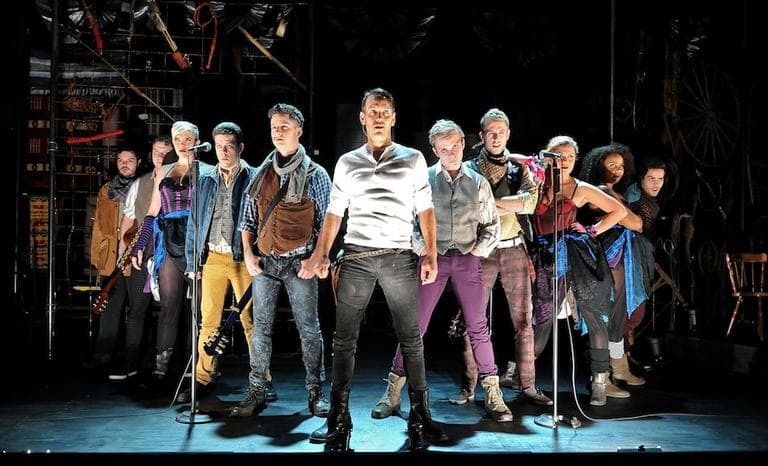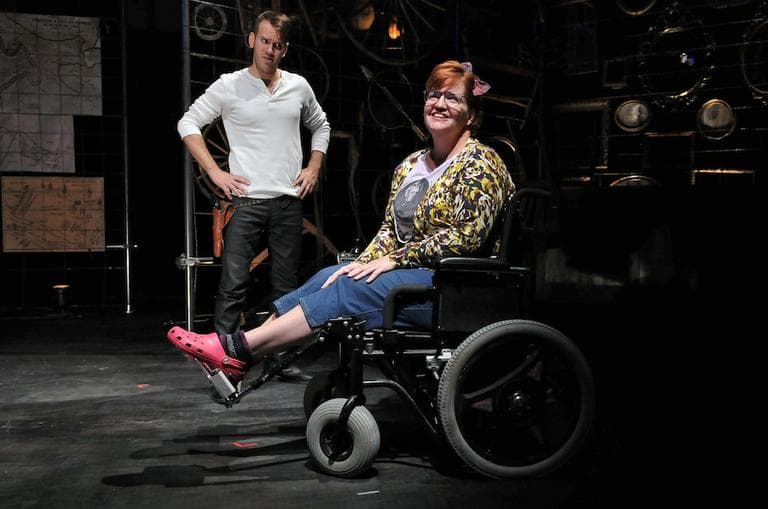Advertisement
Reviews
For A ‘Bloody Bloody’ Good Time, Call Andrew Jackson

Every successful presidential campaign since Harry Truman’s has come down to one overriding issue: Who would you most like to have a beer with? And if you correct the grammar to whom or edit the sentence so it doesn’t end with a preposition, it only proves you don’t get it.
That’s right, it’s not the economy, stupid, it’s how natural you sound dropping your g’s and how good you look in a hunting outfit (Hi, there, John Kerry) or in a military uniform even if you dodged the war (Yes, you, W). These are some of the issues held up for satirical examination and righteous ridicule in the wonderfully entertaining Obie-winning “Bloody Bloody Andrew Jackson,” a unique rock musical (kind of) now being performed with Speakeasy Stage Company’s customary panache at the Boston Center for the Arts (through Nov. 17).
Timbers has a wicked sense of absurdist humor. He and Friedman establish an underpinning for the show that satirizes pop culture more than celebrates it.
But while George W. and Barack O. both come in for satire, this is hardly an attempt to appease both sides with a fence-straddling “plague on both your houses” political tirade. That Jackson rode a populist, pro-Western crusade into the White House is not a good thing in the mind of Alex Timbers who together with his equally talented compatriot Michael Friedman, who wrote the high-energy music and lyrics, are responsible for this delightful mélange.
Timbers, in particular, is a different kind of populist than the antihero he creates onstage. He seems to be channeling Howard Zinn’s “People’s History of the United States” in his analysis of Old Hickory – charting his ruthlessness in dealing with American Indians and just about every other faction that stood in the way of the expansion of the American West and the Jackson ego.
I’m making this sound, though, like something other than the thoroughly engaging and insightful work that it is, beginning with “Populism, Yea, Yea!” — a frighteningly effective Gus Curry as Jackson, leading the band and the rest of the cast in an electric ode to taking the country back (the catchphrase used by Obama supporters in 2008 and the Tea Party in 2010). Friedman's songs often start out sounding like something out of "Rent" before veering off into more indie-rock territory, and with infinitely better lyrics than anything Jonathan Larson ever wrote. One ballad starts out with Andrew's wife, Rachel, singing a standard ballad "I always thought I'd live in a house with a dog and some kids," before adding, "and some slaves." After a few jibes into pop culture it explodes into something more punkish ("I give up everything, you give up nothing.") There's nothing funny however, about "Ten Little Indians," which adapts the old ditty to tell a chilling song about the decimation of Native Americans.
Advertisement
If Jackson bears resemblance to any one political figure, it’s probably Sarah Palin, touting his maverick, anti-elitist swagger at every opportunity. Even Palin, though, looks like a dowdy member of the establishment next to the loutish, hard-drinking Jackson, who’s as likely to use a bullwhip as a bully pulpit on his opponents.
With each passing scene, though, Timbers (the “Children’s Scientology Project") and Friedman (the Civilians’ “Paris Commune”) establish an increasingly smart underpinning for the show, utilizing contemporary pop jargon (“Right?” “Totally”) and gestures to satirize pop culture more than celebrate it. By the time he entertains visitors to the White House by having two female cheerleaders make out with each other, the absurdism seems totally natural.

There is a problem at this point, which is toward the end of this hour and 45-minute production, which is that Timbers gets overly concerned with having made Jackson too likable – which he hadn’t – and overcompensates by making him too loutish, too drunken. Obviously he’s doing some terrible things we didn’t learn in the history books, like ethnic cleansing, but Timbers lets the train go off the rails dramatically before getting back on track.
It’s certainly not the fault of the production. Curry is a charismatic Jackson without ever making him too sympathetic – Timbers didn’t have to worry. Mary Callanan is a very funny Storyteller, with impeccable timing. Costumes, set, music, ensemble – all work as they should under Paul Melone’s excellent direction, but Eric Norris deserves a particular shoutout for a sound design that never shouts out. It’s as clean a sound mix for rock music as you’re going to find.
Still, except for the aforementioned blip it’s Timbers and Friedman who make Jackson a populist for the ages, and not in a good way. Here’s hoping they work together soon. The seamlessness of story and song doesn’t happen very often in theater, particularly when it comes to razor-sharp political satire that cuts to the bone.
This program aired on October 23, 2012. The audio for this program is not available.

